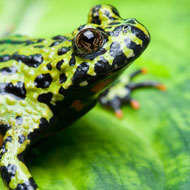Calls to ban trade in amphibians from Asia

International researchers said the study provides strong evidence for banning the trade in amphibians from Asia.
A deadly fungus that is responsible for decimating the world’s amphibian populations is now thought to have originated in East Asia.
Batrachochytrium dendrobatidis (Bd), or chytrid fungus, has long been known as a cause of declines and extinctions in species of frog, toad, newt and other amphibians across several continents. However, its place of origin has remained unclear.
New research published in Science suggests that the human movement of amphibians - for example through the pet trade - has directly contributed to the spread of the pathogen around the world.
International researchers said the study provides strong evidence for banning the trade in amphibians from Asia, owing to the high risk of exporting previously unknown strains of chytrid out of the region.
The research team studied 234 samples of the pathogen from around the world. They identified four main genetic lineages, three of which are distributed globally. The fourth, however, was only found in Korea, on frogs native to the region.
Further analysis revealed that these Korean strains were native to the region, and most closely resemble the ancestor of all modern Bd.
In addition, the findings suggest that the range of the disease expanded greatly between 50 and 120 years ago, which coincides with the rapid global expansion of intercontinental trade.
The study also highlighted another amphibian pathogen, B salamandrivorans (Bsal), which emerged from Asia and is affecting salamanders in Europe. As with Bd, the spread of Bsal is linked with the global trade in pet amphibians from Asia.
Professor Matthew Fisher from Imperial College London, which led the research, said: “Our research not only points to East Asia as ground zero for this deadly fungal pathogen, but suggests we have only uncovered the tip of the iceberg of chytrid diversity in Asia.
“Therefore, until the ongoing trade in infected amphibians is halted, we will continue to put our irreplaceable global amphibian biodiversity recklessly at risk.”



 The veterinary mental health charity Vetlife is inviting the veterinary community to join it for a sponsored cold-water dip.
The veterinary mental health charity Vetlife is inviting the veterinary community to join it for a sponsored cold-water dip.